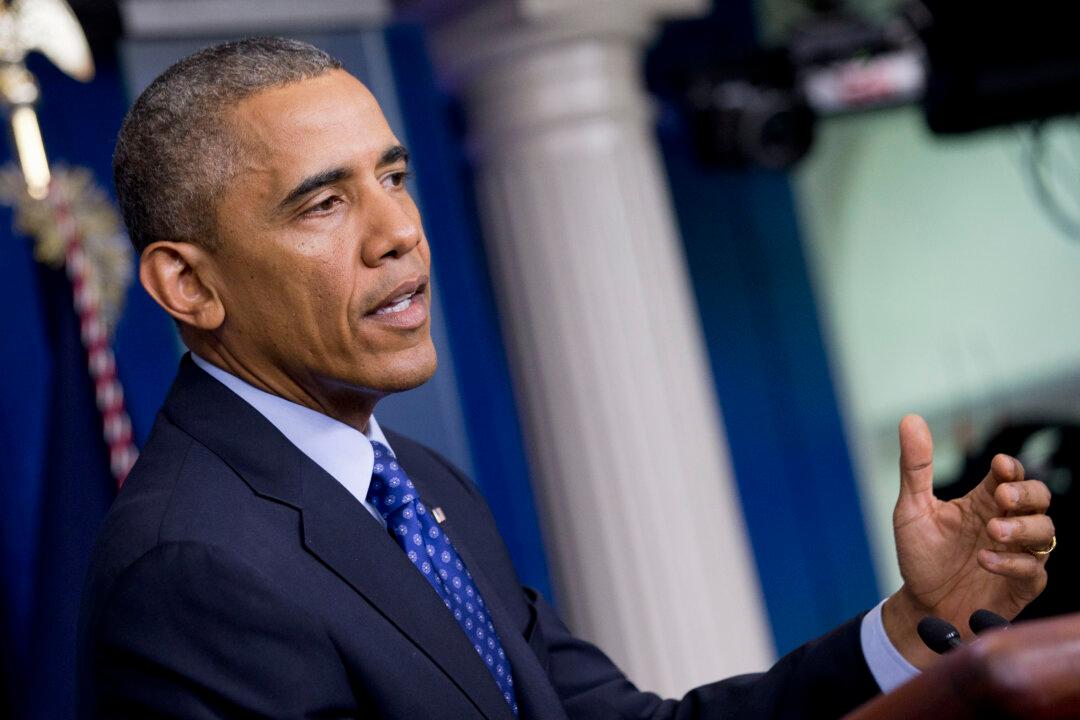WASHINGTON—President Barack Obama announced Thursday that he would send 300 military advisers to Iraq. The country is in danger of takeover by a brutal Islamist militia, or of civil war. Some in Congress have called for Prime Minister Nouri al-Maliki to step aside, but the president did not say that.
He repeated his advice to the Iraqi Shiite-majority government to rule in a way that does not exclude minority Sunnis and Kurds.
No Return to Combat
Obama promised not to restart the Iraq war, “American forces will not be returning to combat in Iraq, but we will help Iraqis as they take the fight to terrorists who threaten the Iraqi people, the region, and American interests as well.”
When coupled with previously announced steps, Obama’s actions could put about 600 additional U.S. troops back on the ground in Iraq. The 300 military advisers he announced Thursday would join up to 275 being positioned in and around Iraq to provide security and support for the U.S. Embassy in Baghdad and other American interests.
He did not mention airstrikes. The argument against them is that the ISIS or Islamic State in Syria and the Levant, who are Sunni militants, are dispersed among Sunni civilians. Air strikes might kill innocent people. However, he did say America will consider “targeted and precise military action, if and when we determine that the situation on the ground requires it. If we do, I will consult closely with Congress and leaders in Iraq and in the region.”
He also did not mention working with Iran, long an enemy of both the United States and Israel, but he did say the United States will “lead a diplomatic effort to work with Iraqi leaders and the countries in the region to support stability in Iraq.”
Secretary of State John Kerry is heading to the Middle East and Europe to consult with “our allies and partners,” said Obama. “And just as all Iraq’s neighbors must respect Iraq’s territorial integrity, all of Iraq’s neighbors have a vital interest in ensuring that Iraq does not descend into civil war or become a safe haven for terrorists.”
Chaos
Half a world away, the chaotic situation in Iraq was underscored by a fight for control of Iraq’s largest oil refinery. As of late Thursday, Iraqi forces and Sunni militants controlled different parts of the sprawling facility and black smoke billowed in the air.
Political leaders debated al-Maliki’s future behind closed doors and Shiite leaders floated the names of potential replacements. The Shiite prime minister has long faced criticism for not making his government more inclusive. Besides the Sunnis, many of al-Maliki’s former Kurdish and Shiite allies have been clamoring to deny him a third term in office.
Fate in the Balance
Sketching a dire situation, Obama called this a moment when “the fate of Iraq hangs in the balance.”
U.S. officials have been concerned that pushing al-Maliki too hard might stiffen his resolve to stay in office and drive him closer to Iran, which is seeking to keep the Shiite leader in power. However the administration does want to see evidence of a leadership transition plan being put in place in Iraq.
Defense Secretary Chuck Hagel, in a statement, said the advisers “will assess the situation on the ground, help evaluate gaps in Iraqi security forces and increase their capacity to counter the threat posed by the Islamic State of Iraq and the Levant.”
According to U.S. officials, the 300 would largely be Green Berets, deployed in teams embedded with Iraqi security forces.
“American forces will not be returning to combat in Iraq, but we will help Iraqis as they take the fight to terrorists who threaten the Iraqi people in the region and American interests as well,” he said.
The Associated Press contributed to this report.





